-
 bitcoin
bitcoin $99177.955738 USD
-7.32% -
 ethereum
ethereum $3187.183061 USD
-12.38% -
 tether
tether $0.999809 USD
0.00% -
 xrp
xrp $2.117933 USD
-9.42% -
 bnb
bnb $906.710033 USD
-9.17% -
 solana
solana $149.367737 USD
-10.74% -
 usd-coin
usd-coin $0.999816 USD
0.01% -
 tron
tron $0.281498 USD
-0.38% -
 dogecoin
dogecoin $0.156292 USD
-8.00% -
 cardano
cardano $0.500744 USD
-10.19% -
 hyperliquid
hyperliquid $38.087358 USD
-4.58% -
 chainlink
chainlink $14.097831 USD
-8.54% -
 bitcoin-cash
bitcoin-cash $463.329916 USD
-9.22% -
 ethena-usde
ethena-usde $0.999078 USD
-0.01% -
 unus-sed-leo
unus-sed-leo $9.475862 USD
-0.79%
How to ensure the security of Bitcoin wallet addresses?
Secure your Bitcoin by using strong passwords, 2FA, a hardware or paper wallet, and avoiding phishing. Regularly back up your wallet and diversify your holdings, staying updated on security best practices.
Mar 23, 2025 at 02:35 pm
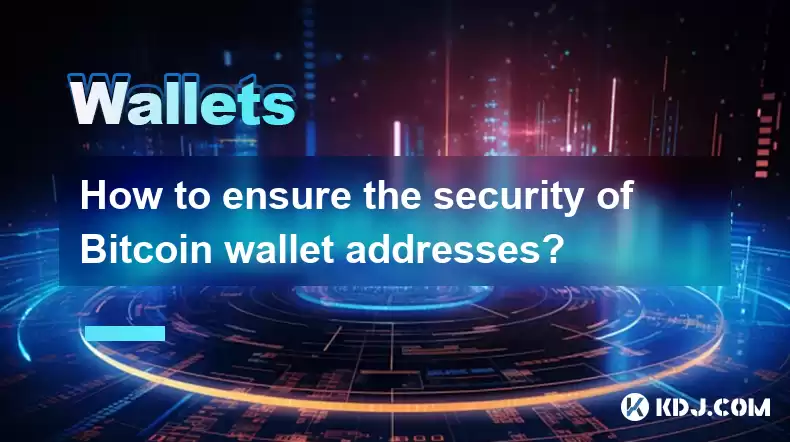
- Understanding the different types of Bitcoin wallets and their inherent security levels.
- Implementing strong password practices and utilizing two-factor authentication (2FA).
- Choosing secure storage options for your private keys, including hardware wallets and paper wallets.
- Recognizing and avoiding phishing scams and malware.
- Regularly backing up your wallet and diversifying your holdings.
- Staying updated on security best practices and software updates.
Bitcoin wallet security is paramount. Losing access to your Bitcoin wallet means losing your funds, irretrievably. This article explores various methods to bolster the security of your Bitcoin wallet addresses. The security of your Bitcoin depends heavily on the security of your wallet.
Understanding Wallet Types and Security:Different Bitcoin wallets offer varying levels of security. Software wallets, while convenient, are more vulnerable to malware and hacking if not properly secured. Hardware wallets, on the other hand, store your private keys offline, offering a much higher level of security. Paper wallets, though secure if handled correctly, are prone to physical damage or loss. Choosing the right wallet type is the first step in securing your Bitcoin.
Password Management and 2FA:Employing strong, unique passwords is crucial. Avoid easily guessable passwords and consider using a password manager to generate and store complex passwords securely. Enabling two-factor authentication (2FA) adds an extra layer of security, requiring a second verification method, such as a code from your phone, before accessing your wallet. This significantly reduces the risk of unauthorized access even if your password is compromised.
Secure Storage of Private Keys:Your private keys are the key to your Bitcoin. Never share them with anyone. For software wallets, ensure you have strong anti-malware and anti-virus software installed and updated. For hardware wallets, choose reputable brands and store them securely. Paper wallets should be stored in a safe, fireproof location, ideally in multiple locations for redundancy.
Avoiding Phishing and Malware:Phishing scams are common in the cryptocurrency world. Be wary of suspicious emails, websites, or messages requesting your private keys or wallet details. Legitimate companies will never ask for such information. Install reputable antivirus software and keep it updated to protect your computer from malware that could steal your Bitcoin. Always verify the legitimacy of any website or communication before interacting with it.
Regular Backups and Diversification:Regularly back up your wallet. This is crucial in case of hardware failure, loss, or theft. The backup method will vary depending on your wallet type. Diversifying your Bitcoin holdings across multiple wallets can also mitigate risk. This means not keeping all your Bitcoin in one single wallet. This way, if one wallet is compromised, you won't lose all your funds.
Staying Updated:The cryptocurrency landscape is constantly evolving, and so are security threats. Stay informed about the latest security best practices and vulnerabilities. Keep your wallet software updated to benefit from the latest security patches. Monitor your wallet activity regularly for any suspicious transactions.
Common Questions:Q: What is a private key, and why is it so important?A: Your private key is a secret code that proves your ownership of your Bitcoin. Without it, you cannot access or spend your Bitcoin. It's crucial to protect it meticulously.
Q: Are hardware wallets truly more secure than software wallets?A: Yes, hardware wallets generally offer superior security because they store your private keys offline, making them immune to most online threats like malware and hacking attempts.
Q: What should I do if I suspect my Bitcoin wallet has been compromised?A: Immediately change your passwords, contact your wallet provider (if applicable), and monitor your account for any unauthorized activity. Consider reporting the incident to the appropriate authorities.
Q: How often should I back up my Bitcoin wallet?A: It's recommended to back up your wallet regularly, at least once a month, or even more frequently if you frequently transact.
Q: What is a seed phrase, and how important is it?A: A seed phrase (also called a recovery phrase) is a list of words that allows you to restore your wallet if you lose access to it. It's extremely important to keep it safe and secure, as it's essentially the master key to your Bitcoin. Never share it with anyone.
Q: Are there any free tools to help manage my Bitcoin wallet security?A: Several open-source tools and resources offer guidance on secure password management, but be cautious and ensure they're reputable. Always prioritize your own due diligence.
Q: Can I recover my Bitcoin if I lose my private keys?A: Generally, no. Private keys are cryptographically linked to your Bitcoin, and without them, recovering your funds is nearly impossible. This highlights the critical importance of secure key storage and backup.
Q: What are some signs of a phishing scam related to Bitcoin?A: Look out for unsolicited emails or messages asking for your private keys or login details, suspicious websites mimicking legitimate exchanges or services, and requests for immediate action under pressure. Always verify the legitimacy of any communication before responding.
Q: How can I stay updated on Bitcoin security best practices?A: Follow reputable cryptocurrency news sources, participate in relevant online forums, and consult with experienced cryptocurrency users. Regularly check for security updates from your wallet provider.
Disclaimer:info@kdj.com
The information provided is not trading advice. kdj.com does not assume any responsibility for any investments made based on the information provided in this article. Cryptocurrencies are highly volatile and it is highly recommended that you invest with caution after thorough research!
If you believe that the content used on this website infringes your copyright, please contact us immediately (info@kdj.com) and we will delete it promptly.
- Token Security, Startups, and 2025: A New Era of AI Security
- 2025-11-05 23:00:01
- Crypto Cloud Mining: Trustworthy Sites and Trends to Watch in 2025
- 2025-11-05 23:05:01
- Bitcoin Price Plunge: Long-Term Holders Dump $45 Billion!
- 2025-11-05 23:25:01
- AI-Powered Ascent: S&P 500 Valuations in the Age of Artificial Intelligence
- 2025-11-05 22:50:02
- Nebius, Token Factory, and AI Inference: A New Era of Open-Source AI?
- 2025-11-05 23:10:02
- Galaxy's Take: Zcash as the Bitcoin Alternative You Didn't Know You Needed
- 2025-11-05 23:55:01
Related knowledge

How to clear the cache in your Coinbase Wallet app?
Nov 05,2025 at 11:55pm
Understanding Cache in Mobile Wallet ApplicationsMobile cryptocurrency wallets like Coinbase Wallet store temporary data to improve performance and sp...
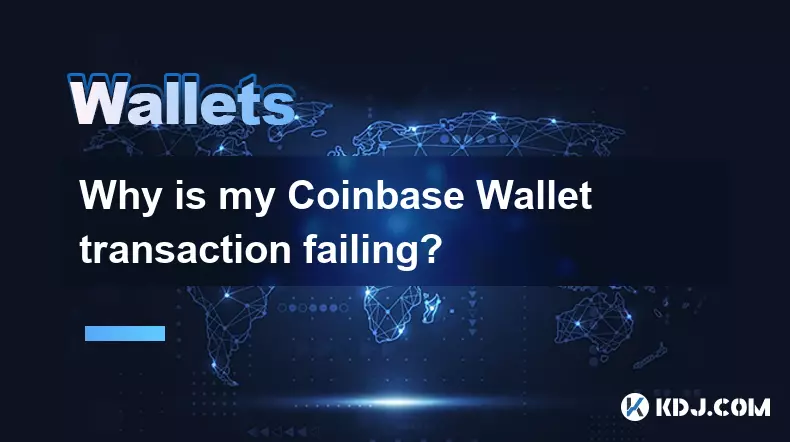
Why is my Coinbase Wallet transaction failing?
Nov 05,2025 at 11:25pm
Common Reasons for Coinbase Wallet Transaction Failures1. Insufficient network fees can lead to transaction rejection. If the gas fee or miner fee set...

What are the fees for using Coinbase Wallet?
Nov 06,2025 at 12:55am
Coinbase Wallet Fees Overview1. Coinbase Wallet itself does not charge any fees for storing or managing digital assets. Users can download and use the...
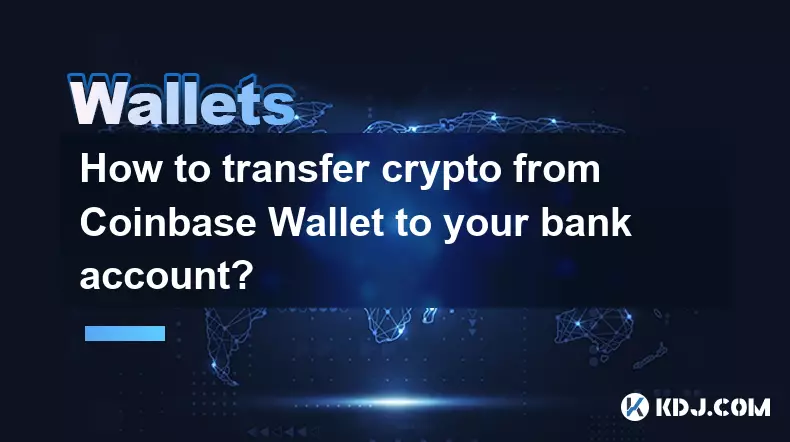
How to transfer crypto from Coinbase Wallet to your bank account?
Nov 05,2025 at 11:29pm
Understanding the Transfer Process from Coinbase Wallet to Bank Account1. Coinbase Wallet operates as a non-custodial wallet, meaning users hold full ...
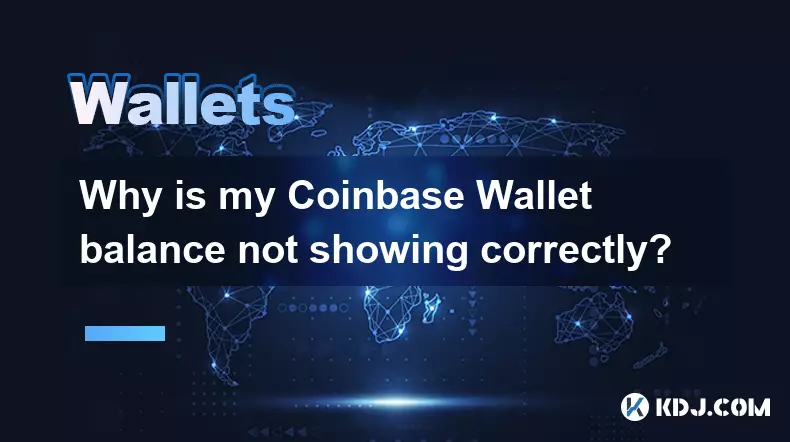
Why is my Coinbase Wallet balance not showing correctly?
Nov 05,2025 at 11:10pm
Understanding Wallet Synchronization Issues1. Network delays can impact how quickly transactions are reflected in your Coinbase Wallet. When a transac...
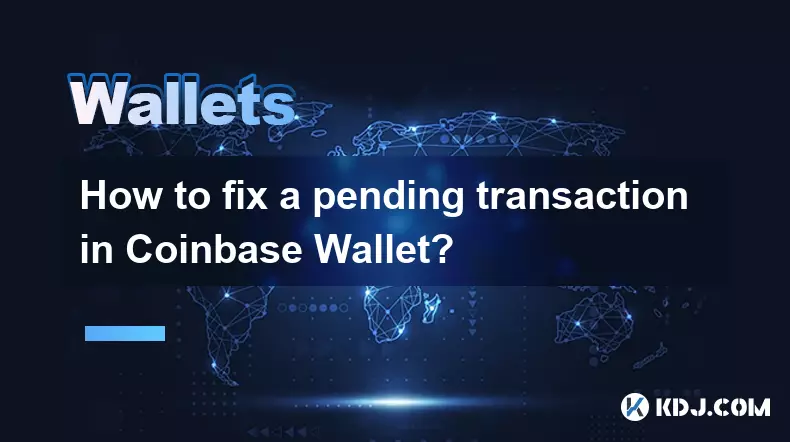
How to fix a pending transaction in Coinbase Wallet?
Nov 06,2025 at 12:59am
Understanding Pending Transactions in Coinbase Wallet1. A pending transaction in Coinbase Wallet occurs when a transfer of cryptocurrency has been ini...

How to clear the cache in your Coinbase Wallet app?
Nov 05,2025 at 11:55pm
Understanding Cache in Mobile Wallet ApplicationsMobile cryptocurrency wallets like Coinbase Wallet store temporary data to improve performance and sp...

Why is my Coinbase Wallet transaction failing?
Nov 05,2025 at 11:25pm
Common Reasons for Coinbase Wallet Transaction Failures1. Insufficient network fees can lead to transaction rejection. If the gas fee or miner fee set...

What are the fees for using Coinbase Wallet?
Nov 06,2025 at 12:55am
Coinbase Wallet Fees Overview1. Coinbase Wallet itself does not charge any fees for storing or managing digital assets. Users can download and use the...

How to transfer crypto from Coinbase Wallet to your bank account?
Nov 05,2025 at 11:29pm
Understanding the Transfer Process from Coinbase Wallet to Bank Account1. Coinbase Wallet operates as a non-custodial wallet, meaning users hold full ...

Why is my Coinbase Wallet balance not showing correctly?
Nov 05,2025 at 11:10pm
Understanding Wallet Synchronization Issues1. Network delays can impact how quickly transactions are reflected in your Coinbase Wallet. When a transac...

How to fix a pending transaction in Coinbase Wallet?
Nov 06,2025 at 12:59am
Understanding Pending Transactions in Coinbase Wallet1. A pending transaction in Coinbase Wallet occurs when a transfer of cryptocurrency has been ini...
See all articles










































































